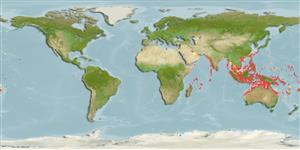分類 / Names
共通名の | 類義語 | Catalog of Fishes(部類, 種) | ITIS | CoL | WoRMS | Cloffa
>
Ovalentaria/misc (Various families in series Ovalentaria) >
Pomacentridae (Damselfishes) > Pomacentrinae
Etymology: Amphiprion: Greek, amphi = on both sides + Greek, prion, -onos = saw (Ref. 45335).
Eponymy: John Clark was an engraver who engraved plates for JW Bennett and aquatinted the results to produce superb illustrations. [...] (Ref. 128868), visit book page.
Environment: milieu / climate zone / depth range / distribution range
生態学
海 関連する礁; 移住性ではない; 深さの範囲 1 - 70 m (Ref. 58652). Tropical; 30°N - 30°S, 47°E - 172°W
Indo-West Pacific: Persian Gulf to Western Australia, throughout the Indo-Australian Archipelago and in the western Pacific at the islands of Melanesia and Micronesia, north to Taiwan, southern Japan and the Ryukyu Islands.
サイズ / 重さ / 年齢
Maturity: Lm ? range ? - ? cm
Max length : 15.0 cm SL オス/雌雄の選別がない; (Ref. 6113); 最大記録サイズ: 11 年 (Ref. 11318)
背面の脊椎 (合計) : 10; 背鰭 (合計) : 15 - 16; 肛門の骨: 2; 臀鰭: 13 - 14.
Adults inhabit lagoons and outer reef slopes. Omnivorous. Oviparous, with elliptical eggs (Ref. 240). Monogamous (Ref. 52884). Oviparous, distinct pairing during breeding (Ref. 205). Eggs are demersal and adhere to the substrate (Ref. 205). Males guard and aerate the eggs (Ref. 205). Associated with the anemones: Cryptodendrum adhaesivum, Entacmaea quadricolor, Heteractis aurora, Heteractis crispa, Heteractis magnifica, Heteractis malu, Macrodactyla doreensis, Stichodactyla gigantea, Stichodactyla haddoni, and Stichodactyla mertensii(Ref. 5911). Has been observed to share home anemone with individuals of A. sandaracinos (Ref. 90000). Has been reared in captivity (Ref. 35418, 35420). Maximum depth reported taken from Ref. 128797.
Life cycle and mating behavior
成熟 | 繁殖 | 放精 | 卵 | 生産力 | 幼生
Benthic spawner. Sex reversal is completed in less than 5-6 months (Ref. 34185). Oviparous, distinct pairing during breeding (Ref. 205). Monogamous mating is observed as both obligate and social (Ref. 52884). Eggs are demersal and adhere to the substrate (Ref. 205). Males guard and aerate the eggs (Ref. 205).
Allen, G.R., 1991. Damselfishes of the world. Mergus Publishers, Melle, Germany. 271 p. (Ref. 7247)
IUCNのレッドリストの状況は (Ref. 130435: Version 2024-1)
Human uses
水産業: 食糧水産; 水族館・水槽: 商業
用具
特記事項
XMLをダウンロードして下さい
インターネットの情報源
Estimates based on models
Preferred temperature (Ref.
123201): 25.3 - 29, mean 27.9 °C (based on 742 cells).
Phylogenetic diversity index (Ref.
82804): PD
50 = 0.5000 [Uniqueness, from 0.5 = low to 2.0 = high].
Bayesian length-weight: a=0.02344 (0.01134 - 0.04848), b=2.98 (2.80 - 3.16), in cm total length, based on LWR estimates for this (Sub)family-body shape (Ref.
93245).
栄養段階 (Ref.
69278): 2.9 ±0.1 se; based on diet studies.
Generation time: 2.7 ( na - na) years. Estimated as median ln(3)/K based on 1
growth studies.
回復力 (Ref.
120179): 手段, 1.4年~4.4年の倍増期間の最小個体群 (Fec = 1,000).
Fishing Vulnerability (Ref.
59153): Low to moderate vulnerability (29 of 100).
Nutrients (Ref.
124155): Calcium = 81.5 [41.5, 125.4] mg/100g; Iron = 0.659 [0.409, 1.063] mg/100g; Protein = 18.2 [17.1, 19.4] %; Omega3 = 0.118 [0.074, 0.185] g/100g; Selenium = 28.5 [16.5, 51.2] μg/100g; VitaminA = 85.3 [24.3, 288.6] μg/100g; Zinc = 1.51 [1.06, 2.15] mg/100g (wet weight);
